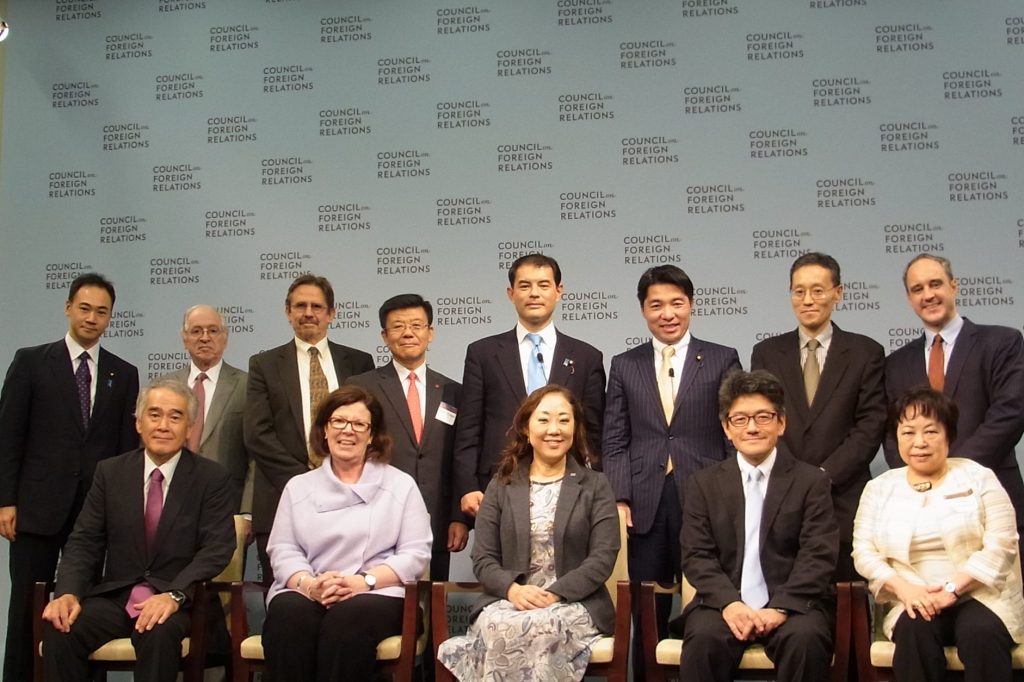The 3rd annual Tadashi Yamamoto Memorial Seminar, co-organized by JCIE and the Council on Foreign Relations, featured four Diet members from the ruling and opposition camps and five leaders from Japanese and US nongovernmental organizations (NGOs) that are playing prominent roles in humanitarian responses and international development.
In the initial session, Keiko Kiyama, who chairs Japan Platform (a coalition of 47 NGOs involved in humanitarian responses) and also is the head of one of those NGOs, JEN, described how much Japan’s NGO sector has advanced over the past 15 years. They are now at the point where Japan Platform annually channels $65 million in funding from Japan’s foreign ministry and the business community to member NGOs to support their expanding activities around the world. However, Kiyama and Randy Martin of Mercy Corps noted that one major difference between Japanese and US NGOs is that the American government is still more inclined than the Japanese government to see NGOs as a strategic partner. As a result, US government agencies have invested considerably in strengthening NGO institutional capacity over the past several decades, helping them grow dramatically in size and efficacy. Japan, they felt, could take lessons from this approach.
The discussion of the institutional capacity of Japan’s NGO sector carried over to the second session, when Katsuji Imata of the Japan NPO Center spoke about how much Japan has to offer to the global community, and how much Japanese NGOs are already quietly contributing. Still, he and his fellow panelists, Kunio Senga of Save the Children Japan and Hiroaki Ishii of the Japan Association for Refugees, agreed that Japan needs to do more to take full advantage of its humanitarian and development NGOs. Loosening restrictions on government funding, for instance, by paying NGOs for the indirect costs involved in administering programs, would do much to help Japanese NGOs grow, while also better equipping them to partner with American NGOs when their interests coincide. Ending on an optimistic note, the panelists noted that the capacity of Japan’s nonprofit sector, and especially that of humanitarian NGOs, had permanently expanded as a result of their full-scale mobilization to respond to the 2011 Tohoku earthquake, tsunami, and nuclear accident. Yet, many challenges still need to be surmounted to allow Japan’s NGOs to live up to their full potential.
In the final session, prominent Japan scholar Gerald Curtis interviewed four rising stars from Japan’s Diet—Masahiko Shibayama and Keisuke Suzuki from the ruling Liberal Democratic Party, Shinichi Isa of Komeito, and Yuichiro Tamaki of the opposition Democratic Party of Japan. The legislators all felt that much still needs to be done in Japan to create a more favorable environment for NGO activities so that Japan can contribute even more on the global stage. They also spoke about Japan’s changing political dynamics, explaining that while the overseas media is paying a great deal of attention to the country’s “emotional right wing,” this group remains a small minority in governing circles and there is considerable consensus in the Diet and the Abe administration about Japan hewing to a moderate foreign policy as a peace-loving nation. Several agreed that, after the recent passage of groundbreaking security legislation, Japan is likely to shift its focus away from defense policy for the foreseeable future. Instead, one of the big challenges will be to see how it can contribute more to human security, including by better empowering civil society to make greater contributions around the world.
Presider: Sheila A. Smith, Senior Fellow for Japan Studies, Council on Foreign Relations
Keiko Kiyama, Secretary General, JEN, Co-Chair, Japan Platform
Randy Martin, Director for Partnership Development, East Asia, Mercy Corps
Presider: James Gannon, Executive Director, JCIE/USA
Katsuji Imata, Executive Director, Japan NPO Center
Hiroaki Ishii, Executive Director, Japan Association for Refugees
Kunio Senga, CEO, Save the Children Japan
Presider: Gerald L. Curtis, Burgess Professor of Political Science, Columbia University
Shinichi Isa, Member, House of Representatives (Komeito)
Masahiko Shibayama, Member, House of Representatives (Liberal Democratic Party)
Keisuke Suzuki, Parliamentary Vice-Minister of Land, Infrastructure, Transport and Tourism; Parliamentary Vice-Minister of Cabinet Office; Member, House of Representatives (Liberal Democratic Party)
Yuichiro Tamaki, Member, House of Representatives (Democratic Party of Japan)
Akio Okawara, President and CEO, JCIE/Japan
Sheila A. Smith, Senior Fellow for Japan Studies, Council on Foreign Relations
The Tadashi Yamamoto Memorial Seminar was made possible thanks to the Council on Foreign Relations and donors to the Tadashi Yamamoto Memorial Fund.

